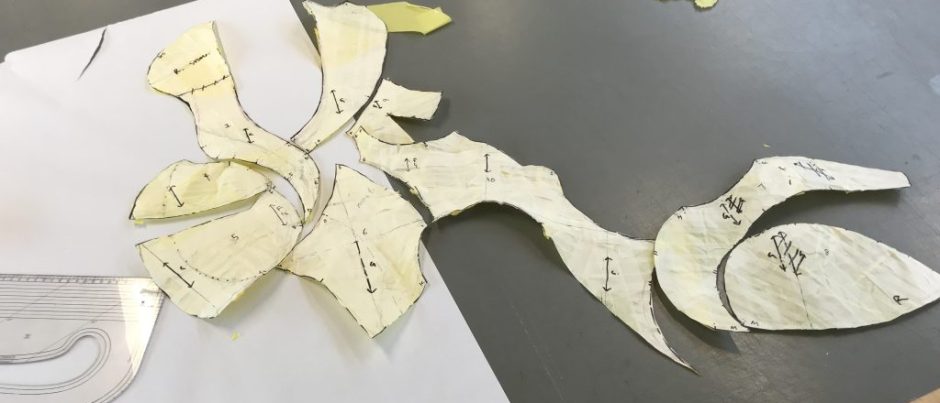Contextual background
I collaboratively plan workshops and create learning resources which compliment or link to unit briefs, or respond to specific areas of technical interest, alongside the facilitation of formative interactions in the open access studio. Our aim is create learning experiences which equip students with the tools they need to develop their practice, and realise innovative, unique physical performance outcomes.
Evaluation
Pre-production periods for circular projects are very short, and costume production is often left until the last possible moment by our students. This often leads to panic, and a stripping back of their design in question order to meet the deadline. Although part of becoming a practitioner is learning one’s own limits, and boiling a design down to its most important components is an important skill to acquire, there is currently lost potential for high quality explorative, playful, experimental, investigative learning experience (Curry, 2017) for lack of appropriate time management.
Moving forwards
Facilitating lived physical experiences
Currently, my technical costume colleagues and I deliver very few workshops which offer students the lived experience of making a costume from start to finish. The effect of this is apparent in students attitudes to planning a realisation process, which is often unspecific and unrealistic. In recently replacing what were previously corset making workshops with more explorative, creative, investigative materials workshops for BA(Hons)P:DP students, one of the very few opportunities for students to acquire the experience of a full making process to draw upon was lost (Orr and Shreeve, 2017). Alternative workshops which afford this opportunity could be instated going forwards, in addition to the redesigned workshops.
Designing a technical curriculum
The aforementioned workshops could be part of the development of a ‘technical curriculum’. In conversation with a colleague who teaches at LCF, I learned that something akin to this is used within various Fashion programmes, in order to appropriately scaffold technical skills, tacit material knowledge, and physical lived experiences alongside, and in relation to, academic development. This is an idea which has already started to be discussed within my department, and with the academic staff it relates to. We hope to initiate this in the coming academic year.
Modelling different approaches to planning
Self-regulation and the use of project time plan is an essential part of professional costuming practice. Development of this skill is not an explicit part of our teaching in the costume studio. Inspired by the microteaching activity of a pg cert colleague, I would like to trial a practical object-based workshop which models different approaches to planning, using relatable processes to exemplify the complexity and unpredictability of any practical project. In conjunction with this, we could introduce an expectation of tangible, recorded time plans as means of monitoring student progress through a project, and enabling them to develop self-monitoring skills (Bamber and Jones, 2015). This would only have meaning if mandatory technical check-ins were instigated as part of this ‘technical curriculum’.
(489 words)
References
Bamber, V. and Jones, A. (2015) ‘Challenging Students, Enabling Inclusive Learning’. In Marshall, S., Fry, H. and Ketteridge, S. (eds.) A Handbook for Teaching and Learning in Higher Education: Enhancing Academic Practice. 4th ed. London: Routledge. Pp. 152 – 168.
Orr, S. and Shreeve, A. (2017) ‘Teaching practices for creative practitioners’. In Orr, S. and Shreeve, A. (eds.) Art and design pedagogy in higher education: knowledge, values and ambiguity in the creative curriculum. Milton: Taylor and Francis Group.
Curry, P. (2017) ‘The Enchantment of Learning and ‘The Fate of our Times’. In Voss, A. and Wilson, S. (eds.) Re-Enchanting the Academy. Seattle: Rubedo Press. Pp.33-51. Available at: http://www.patrickcurry.co.uk/papers/The%20Enchantment%20of%20Learning%20(print%20version).pdf (Accessed: 22nd December 2023)
